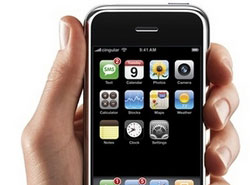
"We’re going to make some history here today," said Steve Jobs this week at the beginning of his annual speech at Macworld, his company’s cult-like trade show in San Francisco.
He was as good as his word. First, he launched a product that promises at last to bring digital entertainment from people’s computers to their television screens without fuss. Then he unveiled an even more impressive device that transcends the description "mobile phone." Jobs made it clear that he considered this day a watershed in the three-decade history of Apple Computer, a point that he emphasized by announcing that his firm would henceforth drop "Computer" from its name. Indeed, Apple’s laptop and desktop computers were hardly mentioned. Nor were Apple’s iPods, which dominate the market for portable music players. Both of the new products are really computers, but people won’t think of them as such, since they will be in their pockets and living rooms. The mobile phone — provided Apple can settle a legal dispute over the name with Cisco, a network-equipment company — is called the iPhone. It will go on sale in the U.S. in June starting at US$499, in Europe in the autumn and in Asia next year. The television set add-on is called Apple TV and will hit stores next month at $299. With these two products, Jobs intends to enter and transform new industries, and ultimately people’s lives — just as he did in 1984 when Apple transformed computing with the launch of the Macintosh, and again in 2001 when it introduced the iPod, which shook up the music industry. That Jobs’ announcements had such an impact during this particular week says a lot, because the rest of the consumer- electronics, computer and telecoms industries were simultaneously congregating at the Consumer Electronics Show, the world’s biggest technology fair, in Las Vegas. There, many of Jobs’ old and new rivals were talking about much the same things as he was. Microsoft’s Bill Gates introduced the Windows Home Server, his answer for uniting computers and TV sets. Olli- Pekka Kallasvuo, boss of Nokia, a mobile-phone giant, unveiled new handsets that can hold music and videos. But all the gadgets being peddled in Las Vegas were "evolutionary," whereas Apple’s were "revolutionary" and thus noteworthy, says Tim Bajarin, the boss of Creative Strategies, a technology consultancy in California’s Silicon Valley. |





